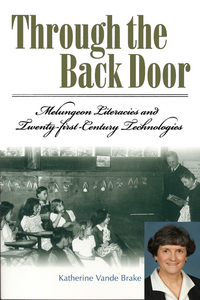

Dr. Katherine Vande Brakegives new insights about the Melungeons.
BRISTOL, Tenn. – "Through the Back Door: Melungeon Literacies and 21st Century Technologies" gives a different view of Appalachia's Melungeons, a multi-ethnic group of uncertain origins first documented in Appalachia nearly 200 years ago.
Dr. Katherine Vande Brake details their acquisition of school literacy and explains how their literacy practices have shaped not only their perceptions of themselves but their existence to outsiders.
Based on extensive interviews with Melungeon descendants and thoughtful analysis of their Internet presence, Vande Brake gives new insights about the Melungeons' life experience and the effects reading and writing have had in their lives.
Just a century ago, while specialized practices such as farming, preserving food, hunting, gathering, and distilling ensured survival in the unforgiving mountain environment, most Melungeons could neither read nor write and refused to see those skills as part of a cultural imperative. Required to pay property taxes and render military service, they were denied education, suffrage, and free access to the courts.
In the late 1890s, visionary Melungeon leader Batey Collins invited Presbyterian home missionaries to settle in Vardy, a Tennessee Melungeon community, where they established a church and built a school of unparalleled excellence. Educator-ministers Mary Rankin and Chester Leonard creatively reified the theories of theologian Walter Rauschenbusch and educational theorists John Dewey and Maria Montessori. However, despite the missionaries' heroic efforts, school literacy did not neutralize difference.
"In the 21st century, a time when literacy is taken for granted, Melungeon descendants are exploring their ethnic identity by creating web sites and participating in listserv discussions," stated Dr. Vande Brake. "These online expressions, which provide texts for rhetorical, semiotic, and sociolinguistic analysis, illustrate not solidarity within the Melungeon community but fragmentation on issues of origins and legitimacy. Armed with literacies of difference stemming from both their natures and their social situations, Melungeons are using literacy practices to embrace the differences they cannot escape."
Vande Brake is dean of the School of Arts & Sciences at King College in Bristol, Tennessee, where she has taught English and Technical Communication since 1980. She researches Melungeons, focusing on their present -- depiction in fiction, literacy, and Internet presence -- rather than origins or history.
Raised and educated in Michigan, Vande Brake lives and works in Appalachia celebrating regional culture and traditions. Her study of Melungeon characters in Appalachian fiction called "How They Shine" was published in 2001.